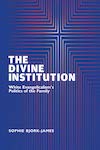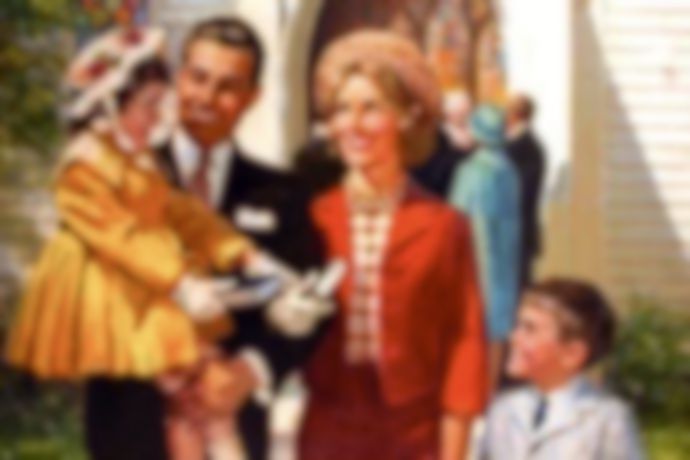At a small group Bible study in suburban Colorado Springs, circa 2008, a group of 20-something white professionals gathered to discuss Mark 10:21-25. In this famous parable, Jesus instructs a rich man to sell all that he has and give it to the poor. The rich man dejectedly walks away, unwilling to comply. Jesus tells his disciples—in words many Christians can recite by heart—“It is easier for a camel to go through the eye of a needle than for someone who is rich to enter the kingdom of God.”

The Divine Institution: White Evangelicalism’s Politics of the Family
Sophie Bjork-James
Rutgers U. Press
March, 2021
But if some passages are to be understood metaphorically, others do require a literal interpretation. These same evangelicals see scriptural prohibitions against same-sex behavior and in favor of male headship as timeless decrees. How do believers navigate this hermeneutical minefield? What nudges evangelicals toward these “proper” interpretations of the Bible?
Bjork-James finds the answer in her focus on the family as the “divine institution” that mediates evangelical biblical interpretation—and so much more. This is not entirely new terrain; many historians and religion scholars have illustrated the centrality of family values to evangelical politics. What distinguishes Bjork-James’ work, quietly published this past spring, is the ethnographic intimacy of her observations. She shows how familial norms structure the ways evangelicals talk about race, homosexuality, “biblical” issues, and conversion. Bjork-James argues that understanding evangelical family values from the inside is the best way to make sense of white evangelical worlds.
This is the point at which most readers—myself included—mentally cycle through a litany of evangelical hypocrisies, ticking off politicians and ministers whose fulsome defense of family values hardly matches their sexual behavior. Some of these men even show up in Bjork-James’s account.
Yet what seems like unconscionable hypocrisy from the outside seems to cause few ripples on the inside. “Sacred familialism”—the phrase Bjork-James uses to indicate evangelicals’ worship of a rigid family norm—is so central to evangelical understandings of the Bible that few of her subjects question its veracity. If high-profile evangelicals cheat on their spouses or engage in same-sex behavior, they either repent or lose standing in the movement. Evangelicals who express serious misgivings about the patriarchal family model typically move away from evangelicalism.
Of course, the patriarchal family model that evangelicals prize is rooted not in the world of the Bible but in the Victorian era. Bjork-James masterfully documents how racial assumptions structured this model. 19th century white Christians defined their families against those of Native Americans and African Americans, enshrining a racialized standard as biblical. Occasionally white evangelicals reveal the racialized assumptions of family values. Bjork-James quotes Manuel Belin, a Latino who worked for an evangelical nonprofit in Colorado Springs: “Even though we picture Latino families as family units, they are a very unhealthy structure [compared] to the way they do family.”
The family at the center of evangelical values is patriarchal, heterosexual, well-off, and white. It is neither intergenerational nor dependent on social welfare or charity. The reality that fewer families every year can attain this ideal doesn’t diminish its power. Indeed, as Bjork-James shows, the decline of single-earner nuclear families over the last 60 years suggests to white evangelicals a need to fight for a world that’s slipping away. Bjork-James meets evangelicals who connect their conversion to Christianity with an awakening to what she calls “paternal politics.” One of these, Dustin Henry, said he woke up the morning after a dramatic conversion and “just knew for the first time I was wrong about abortion.” Henry later went to work for a group that opposes gay rights.
The priority white evangelicals place on gay rights and abortion underlines the centrality of the patriarchal family. The family provides a model of authority and hierarchy that structures all sorts of assumptions white evangelicals make about the world—assumptions that can appear apolitical to evangelicals.
But when evangelicals find themselves questioning the goodness of the patriarchal family—when they want to include gay families in their church, or empower women to challenge male dominance—they quickly find themselves on the outside looking in. Evangelicalism is shrinking and aging. Young former evangelicals frequently cite the politicization of the church as a primary reason for their departure.
This exodus has diminished the political diversity of white evangelicals, a reality well-documented by their overwhelming support for Donald Trump. Like some evangelical leaders, Trump doesn’t practice family values. But he promised to fight for a world they once knew, where men were men and women knew their place; a world where white Christians enjoyed a cultural supremacy that seems to be slipping away.
If that’s where ‘family values’ leads white evangelicals—to support an amoral narcissist—perhaps evangelicals would have been better off reading the whole Bible literally. Then they would at least believe that, like the rich man in Mark 10, Trump’s chances of entering the kingdom of God are about as good as… well, you know. The tragedy of white evangelicalism is how blinkered their vision of family is. They constructed a theology built on white supremacy and patriarchy, and wound up hitching their movement to a politician who embodied both.





